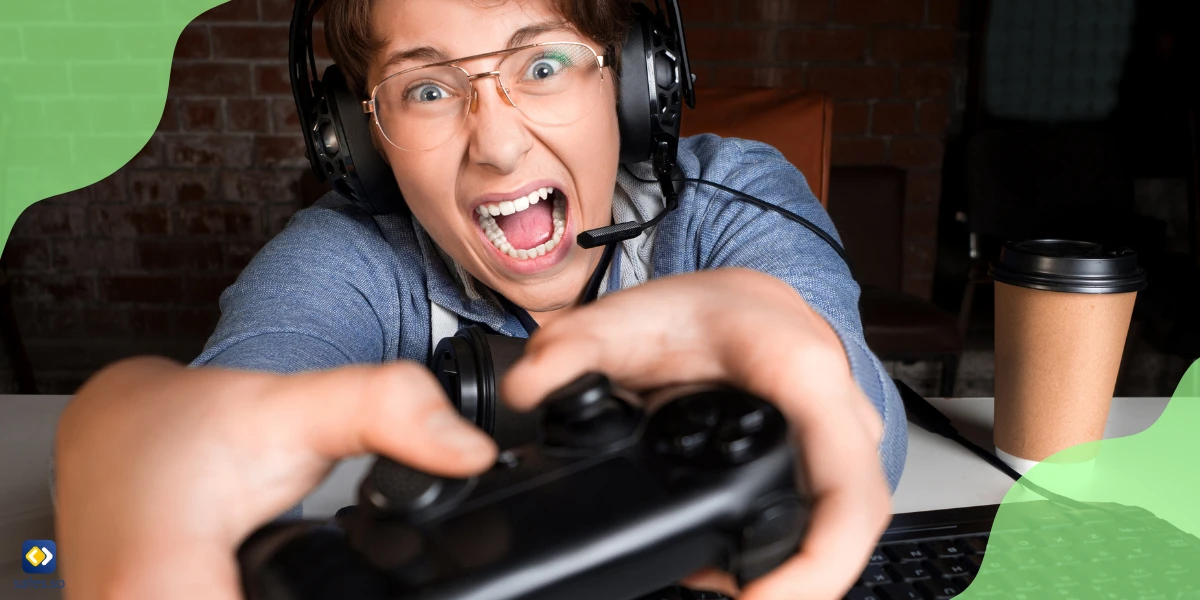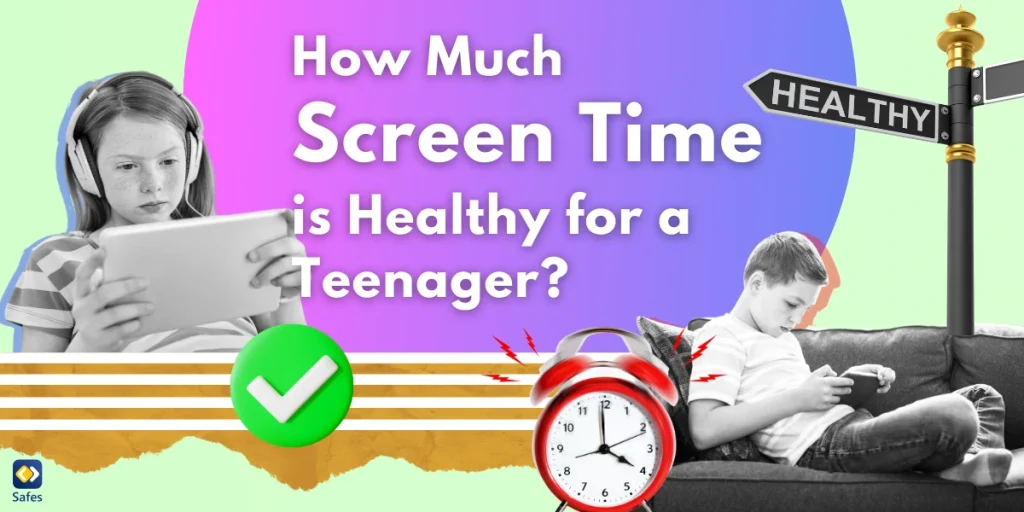Are you concerned about your teenager’s gaming habits? With the rise of online gaming and the increasing popularity of esports, it’s important to monitor your child’s gaming behavior to ensure it doesn’t become problematic. Problematic gaming behaviors can lead to negative consequences such as poor academic performance, social isolation, and even addiction. In this blog post, we’ll explore healthy gaming for teenagers, the warning signs of problematic gaming behaviors in teenagers, the negative consequences of these behaviors, and what parents can do to help their teens overcome them. So, if you’re a parent worrying about your teenager’s gaming habits, keep reading.
Download and Start Your Free Trial of the Safes Parental Control App
Warning Signs of Problematic Gaming Behaviors
There has always been a controversy about video games, but today most people believe they have both good and bad effects on children. While healthy gaming can have positive results, such as stimulating creativity and encouraging teamwork, excessive gaming or playing age-inappropriate games can lead to problematic behaviors. Use the following list of signs and symptoms to see if your child is having inappropriate gaming behavior.
- Obsession With Gaming: An obsession with gaming is characterized by an intense preoccupation with gaming that consumes significant time and energy.
- Loss of Interest in Other Activities: If a teenager loses interest in other activities that they previously enjoyed, it may be a warning sign of problematic gaming behavior.
- Agitation and Irritability When Not Gaming: When a teenager becomes agitated or irritable when they are not able to play video games, it may indicate problematic gaming behavior.
- Difficulty Controlling Gaming Habits: If a teenager has difficulty controlling their gaming habits, such as playing for extended periods or at inappropriate times, it may be a warning sign of problematic gaming behavior.
- Neglecting Responsibilities and Relationships: Neglecting responsibilities and relationships, such as not completing schoolwork or neglecting friendships, may be a sign that a teenager’s gaming behavior is problematic.
- Withdrawal from Social Activities: When a teenager withdraws from social activities, such as spending time with friends or participating in extracurricular activities, it may indicate problematic gaming behavior.
- Physical Symptoms: Physical symptoms, such as headaches, eye strain, and fatigue, may indicate that a teenager is spending too much time playing video games.
Negative Consequences of Problematic Gaming Behaviors
Problematic gaming behaviors often result in destructive consequences. Teenagers may not think much of these consequences as they’re too young to consider their longtime effects. However, as a parent, you should try to protect your child from them. Here are the most important consequences that you should protect your child from.

Academic Problems
Academic problems can manifest in poor grades, incomplete assignments, and truancy. Excessive gaming can interfere with a teen’s ability to concentrate, complete homework, and attend classes regularly.
Physical Health Problems
Physical health problems can arise from prolonged sitting and a sedentary lifestyle. Teenagers who spend a lot of time gaming may be at risk for obesity, sleep disturbances, and other health issues.
Mental Health Problems
Mental health problems, such as depression and anxiety, can develop from excessive gaming. Gaming can be a form of escapism, and teens who have underlying mental health issues may turn to gaming as a way to cope.
Social Problems
Social problems can arise from excessive gaming, such as isolation, poor relationships with family and friends, and difficulty forming new relationships.
Financial Problems
Financial problems can arise from spending too much on gaming, such as purchasing expensive gaming consoles, games, and in-game purchases. Teens who spend a lot of money on games are often short for more important expenditures such as books, courses, and socializing with friends. They tend to be in debt to their peers who lend them money. They may also pressure their parents to give them more money.
Ethical Problems
It may not be the first thing that comes to your mind, but unhealthy gaming behaviors sometimes lead to unethical actions. When pressured by parents to control their gaming, children tend to lie to their parents about the time they spend playing. Moreover, when parents refuse to give more money to children to purchase games, sometimes they find refuge in taking money without their consent or even stealing from others.
How to Help Your Teen Overcome Problematic Gaming Behaviors
Thankfully there are many tried and true solutions to overcome problematic gaming behavior. You, as a parent, are the best person who can help your child; however, seeking professional help and using tools such as parental control apps can make the job easier for you. In the following, we’ve collected a range of tips to help your teen overcome problematic gaming behaviors.

Establish Healthy Gaming Habits
- Set limits on screen time: This involves setting daily or weekly limits on the amount of time your teen spends gaming.
- Encourage breaks and other activities: Encourage your teen to take frequent breaks and to engage in other activities, such as exercise or hobbies.
- Monitor content and age-appropriateness: Monitor the games your teen plays and ensure they are age-appropriate and do not contain violent or explicit content.
- Use parental and privacy settings: Use parental control features on social gaming platforms to manage privacy and permissions for mobile games and apps to promote safe and healthy gaming further.
Address Underlying Issues
- Stress and anxiety: Help your teen manage stress and anxiety through relaxation techniques or seeking professional help if needed.
- Mental health problems: If your teen struggles with mental health issues, such as depression or ADHD, seek professional help.
- Peer pressure and social anxiety: Address any peer pressure or social anxiety issues your teen may have and help them develop healthy coping mechanisms.
Seek Professional Help
- Therapy and counseling: Consider therapy or counseling for your teen to address any underlying issues contributing to their problematic gaming behaviors.
- Support groups: Look for support groups in your area for teens struggling with gaming addiction or other behavioral issues.
- Addiction treatment programs: In more severe cases, consider addiction treatment programs to help your teen overcome their gaming addiction.
Use Parental Control Apps Like Safes
The Safes parental control app can be an effective tool for parents to promote healthy gaming for teenagers. By using Safes, you can block harmful gaming platforms and age-inappropriate gaming apps while monitoring and controlling how much your teenager spends playing games on their phones, tablets, or computers. This can help prevent teenagers from developing problematic gaming behaviors and experiencing negative consequences such as academic, physical, mental, social, and financial problems.
Safes is a multiplatform parental control app. That means no matter if you or your child use an Android or iOS device, you can use Safes to protect them. Get a taste of Safes’ features with a free trial and improve your child’s digital experience. Follow the links below to learn how to install and use Safes:
- Windows parental controls
- Macbook parental controls
- Parental controls on Android
- iPhone parental controls
Healthy Gaming for Teenagers: Conclusion
In conclusion, gaming for teenagers can be a fun and engaging activity, but it can also lead to problematic behaviors if not monitored properly. Establishing healthy gaming habits, addressing underlying issues, and seeking professional help are some of the solutions to help teenagers overcome problematic gaming behaviors. Additionally, parents can use tools like the Safes parental control app and parental control features on social gaming platforms to promote safe and healthy gaming for teenagers. By taking a proactive approach, we can ensure that gaming remains a positive and enjoyable experience for teenagers while safeguarding their well-being.
Your Child’s Online Safety Starts Here
Every parent today needs a solution to manage screen time and keep their child safe online.
Without the right tools, digital risks and excessive screen time can impact children's well-being. Safes helps parents set healthy boundaries, monitor activity, and protect kids from online dangers—all with an easy-to-use app.
Take control of your child’s digital world. Learn more about Safes or download the app to start your free trial today!




